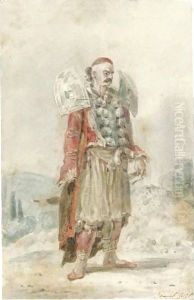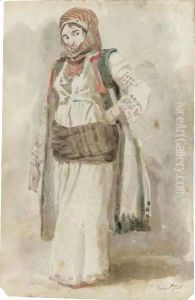Louis Francois Sebastien Fauvel Paintings
Louis Francois Sebastien Fauvel, born in 1753, was a distinguished French painter, architect, and archaeologist whose work, particularly in Greece, left a significant imprint on the study of Greek antiquities and neoclassical art. Fauvel, who ventured to Greece in the late 18th century, became one of the pioneering European figures in the field of archaeology, dedicating his life to the exploration and documentation of ancient Greek architecture, artifacts, and art.
Fauvel's journey to Greece was initially motivated by his artistic and architectural interests, but his work soon transcended these fields, making substantial contributions to archaeology at a time when the discipline was in its nascent stages. Residing in Athens for many years, Fauvel was deeply immersed in the study of ancient Greek civilization. He meticulously sketched and documented numerous archaeological sites, ancient sculptures, and artifacts, some of which were unknown to the Western world at that time.
His contributions were not limited to fieldwork; Fauvel also amassed a significant collection of Greek antiquities, including vases, sculptures, and inscriptions, which later became crucial for scholars studying ancient Greece. Despite facing challenges, including political instability in the region and limited resources, Fauvel's dedication to his work never waned. His detailed drawings and notes have been invaluable to later generations of historians and archaeologists, providing insights into the ancient world that were previously inaccessible.
Fauvel's impact extended beyond his immediate contributions to archaeology and art history. By sharing his findings with scholars and the public in Europe, he played a pivotal role in the diffusion of neoclassical aesthetics, influencing contemporary art and architecture. His work inspired a renewed interest in classical antiquity in the late 18th and early 19th centuries, contributing to the neoclassical movement that swept through Europe.
Louis Francois Sebastien Fauvel died in 1838, leaving behind a legacy that continues to influence the fields of art history, archaeology, and the appreciation of ancient Greek culture. His life and work exemplify the profound impact that dedicated scholarship can have on our understanding of the past, bridging historical epochs and inspiring future generations of scholars and artists.

